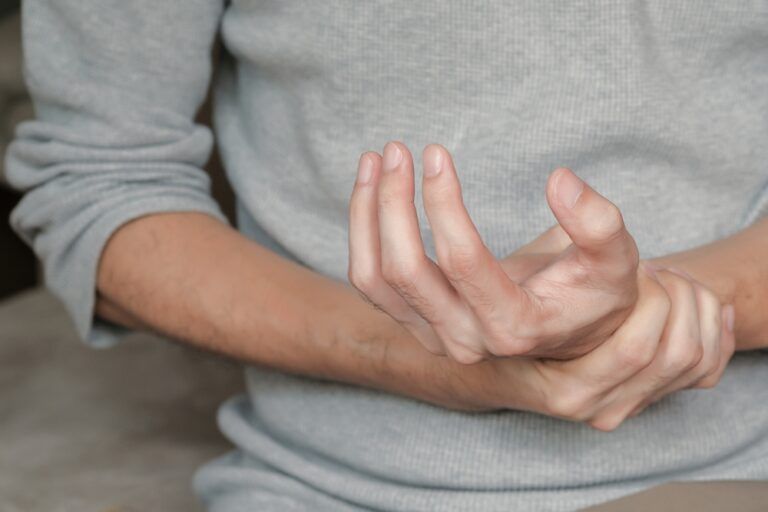The 3 Most Common Nerve Disorders:
1. Carpal Tunnel Syndrome: The carpal tunnel is characterized as a narrow passageway surrounded by bones and ligaments on the palm side of the hand. Carpal tunnel syndrome (CTS) occurs when the median nerve is compressed as it extends through the hand down the wrist at the carpal tunnel. It is the most frequent focal neuropathy. Focal neuropathies are conditions in which you obstruct single nerves, commonly in your hand, head, torso, or leg. This type of nerve irregularity is less common than peripheral or autonomic neuropathy. CTS occurs more commonly in women.
2. Peripheral Neuropathy: Peripheral neuropathy is a medical condition in which the nerves get obstructed. Depending on the nerve this may cause a decrease in sensation and muscle weakness. Damage to nerves that supply internal organs may affect digestion, sweating, sexual function, and urination. Approximately 25 million people in the United States have a form of peripheral neuropathy which may present a variety of symptoms and follow different patterns.
3. Ulnar Neuropathy: Ulnar neuropathy is a medical condition in which the ulnar nerve is compressed as it expands across the elbow or the wrist. It is considered to be the second most common site of nerve entrapment in the upper extremity, the first being the wrist. Ulnar Neuropathy occurs more frequently in men.
What Are The Signs and Symptoms Of These 3 Conditions?
Symptoms of CTS
This condition commonly causes numbness and tingling sensations in the thumb, index, middle finger, and half of the ring fingers. The numbness often is typically more noticeable at night, possibly related to an awkward sleep position causing prolonged flexion of the wrist. As symptoms progress, the pain may travel up the arm and it will be perceived as shoulder or forearm pain.
Symptoms of Peripheral Neuropathy
Symptoms vary among patients depending on which nerve fibers are affected. The nerves can be divided into the sensory, motor, or autonomic fibers. Some neuropathies may affect one or two types, while others affect all three types of nerves. The classification, therefore, involves the type of nerve fibers affected. Common symptoms include the following:
- Tingling
- Numbness
- Dry mouth
- Constipation
- Loss of reflexes
- Positional sense
- Irregular heartbeats
- Loss of bladder control
- Inability to sweat normally
- Pain and temperature sensations.
- Diminish the ability to feel pain or changes in the skin temperature.
- Damage to those fibers causes muscle weakness and shrinkage
- Blood pressure fluctuations may result in dizziness, lightheadedness, or fainting.
Symptoms of Ulnar Neuropathy
Common symptoms of this condition are numbness and tingling sensations confined to the fourth and fifth fingers and elbow pain that can extend to the shoulder. The numbness may be more noticeable at night, possibly related to an awkward sleep position causing prolonged flexion of the elbow. If left untreated, it may progress to involve the motor fibers leading to difficulty using the fingers and weakness of hand grip as patients report trouble with ordinary daily tasks.
How Do You Treat These Diseases?
An electrodiagnostic study (Nerve conduction study and Electromamography) is necessary to confirm any nerve disorder. Dr. Yono and Dr. Kashouty from Premier Neurology and Wellness Center in Stuart, FL are highly specialized and fellowship-trained neurologists experienced in properly diagnosing and treating carpal tunnel syndrome, peripheral neuropathy, and ulnar neuropathy.
- CTS: An ultrasound can also be used as a supplemental aid to exclude other diseases and to ensure an accurate diagnosis of carpal tunnel. Once a proper diagnosis is confirmed, initial treatments such as wrist splints and steroid medication injections are recommended to relieve pain or discomfort caused by CTS. If conservative therapy fails to alleviate the symptoms, carpal tunnel release surgery should be considered.
- Peripheral Neuropathy: Identifying the type of nerve damage that is caused, greatly affects the proper treatment and prognosis. For example, if peripheral neuropathy is caused by a vitamin deficiency, it can be treated with vitamin therapy and an improved diet. Transcutaneous electrical nerve stimulation (TENS) is an effective method of pain relief. This procedure involves placing electrodes on the skin to deliver a gentle electric current at varying frequencies. Physical therapy may also be recommended by your provider to help retain strength and prevent muscle cramping and spasms. Medications such as antidepressants(doxepin), and antiepileptics(gabapentin and pregabalin) are options considered for more moderate symptoms. If nerve damage results from injury or compression, surgery is an available option.
- Ulnar Neuropathy: Similar to carpel tunnel ultrasounds can be used to inspect the anatomy of the elbow and the wrist to ensure a proper diagnosis. Initially, treatments such as a splint or reversed elbow pad along with oral medications, are recommended to relieve the symptoms of ulnar neuropathy. Physical therapy could also be recommended to retain strength. If conservative therapy does not succeed, ulnar release or decompression surgery may be necessary.
It is important to discuss your treatment with an expert to make an appointment with this team call (772) 210-2447 or request an appointment online.




